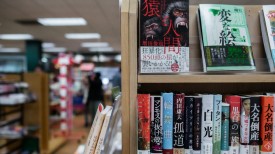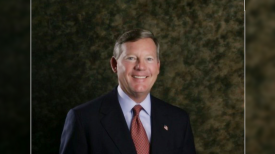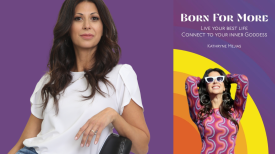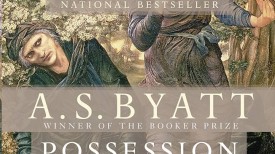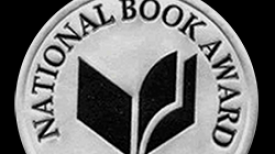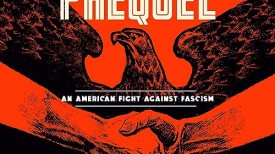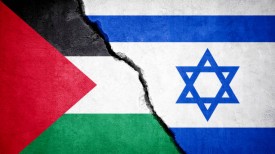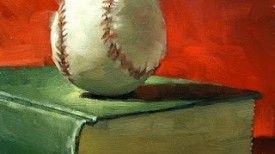Nathan Englander Writes about Family, the Holocaust and what it is Like to be Jewish
Author Nathan Englander's new collection of short stories is based largely on his experiences growing up as a modern Orthodox Jew with an overprotective mother.
In Nathan Englander's new collection of short stories, "What We Talk About When We Talk About Anne Frank", the author talks about his own faith, religious tension, Israeli-American relations and what it means to be Jewish.
Englander's time in Jerusalem overlapped with a period of brutal violence in the city. He says the constant real threat of violence actually made him more comfortable living his daily life. "That was a huge discovery," he says. "If you're paranoid and you put yourself in a place of real existential threat, then you're not paranoid anymore. It was a huge relief for me on that front. It was like living in Catch-22. ... The state of panic - I didn't stick out in a crowd anymore - the cold sweat was just general."
On why he wanted to translate the New American Haggadah (The Haggadah is the traditional story of Passover)
"Out of all the traditional Jewish documents, it's the one that's most living. There's an Armed Forces Haggadah and an Alcoholics Anonymous Haggadah and an LGBT Haggadah. Some people make a new Haggadah every year. It's a real living document. ... They're just constantly made throughout time. On the decision to translate it? It was really clear when I went back and looked at texts. I've always used the Hebrew side of the Maxwell House [Haggadah], which is a really great liturgy. The point is, I had never really looked at the English. And what committed me to it [was that] you should literally read the Haggadah and weep. It is so beautiful. It is just such a moving document to me."
On his fiction
"Every book better be fully intimate, it better be all you have. I'm obviously not shy because I'm going to talk your ear off today, but I'm private, which is different. But the idea for me to be truly intimate - for me to be naked and raw - the fiction allows me to do what I need to do emotionally. And with this book, certain stories were looking at things - it was a change for me to look at things that were right there. And in a sense, this was normality - this game - and I just took a step back and said, 'My god, we're pathological.'
On going to a religious day school
"This education that I fought so wildly against was a huge effort for my parents to give me that education. We had these old-school rabbis. And I think that's the reason I write the way I do. ... [At the University of Iowa, one professor told me] that I was writing all of my sentences in transliterated Yiddish. My mom's from Boston and my dad's from Brooklyn but I hear everything [in a Yiddish] rhythm."
On living in Israel
"As someone who spent a lot of years living in Jerusalem, one of the great perks is that when you come back, and you get into these Israel arguments in your American-Jewish clan, you can really just silence them by saying, 'I lived there.' So we used it like a bludgeon."
On becoming more secularized from his Orthodox upbringing
"I've been comparing it to friends' coming-out stories. When you're in a world and your parents are one way and you're told, 'This is how the whole world is, and this is how you're supposed to be,' and you're terribly unhappy in that world, it's a very scary thing. The whole time I was so religious and so sincere and so interested in the texts, but thinking this is not the world for me. And it grew and it grew."
© 2023 Books & Review All rights reserved.
Popular Now
1
Books to Read After 'Fourth Wing': Top Picks for Fantasy and Romantasy Fans

2
‘The Secret Public’ by Jon Savage Book Review: An Insightful Look Into the LGBTQ Influence

3
Stephanie Regalado's 'If They Only Knew' Column Is Now A Book, Unleashing 60 Anonymous True Stories to Empower Women

4
'No Wire Hangers' Scene That Almost Did Not Happen: New Book Reveals Faye Dunaway's Struggles

5
Rare First Edition of Aphra Behn's Novel 'Oroonoko' Discovered in Kent: A Historic Literary Find

Latest Stories
Book Reviews
‘The Secret Public’ by Jon Savage Book Review: An Insightful Look Into the LGBTQ Influence

Book News
Stephanie Regalado's 'If They Only Knew' Column Is Now A Book, Unleashing 60 Anonymous True Stories to Empower Women

Book News
'No Wire Hangers' Scene That Almost Did Not Happen: New Book Reveals Faye Dunaway's Struggles

Book Reviews
‘The Perfect Couple’ by Elin Hilderbrand Book Review: A Captivating Summer Mystery

Book News
New Book ‘The Franchise’ Reveals Penguins President Kyle Dubas’ ‘Biggest Mistake’ as Maple Leafs GM

